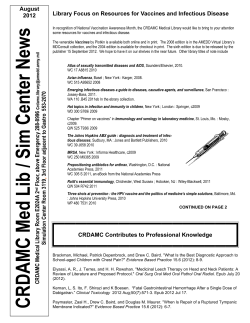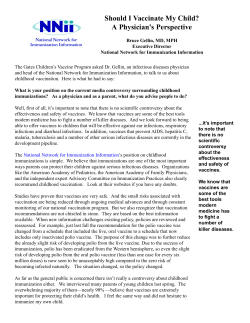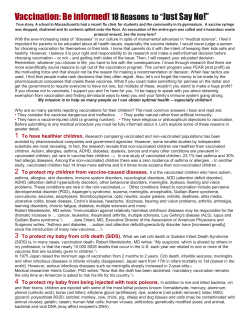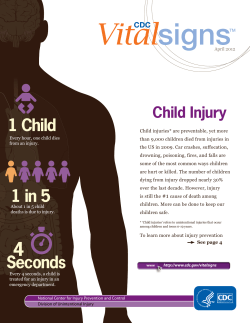
HealthVantage Mommy Series Article Week 4 Immunizations
HealthVantage Mommy Series Article Week 4 Immunizations How Vaccines Work Your infant is born with an immune system capable of recognizing germs as “foreign” invaders, or antigens, and then producing antibodies in response to fight these invaders off. Memory cells are the cells that produce these antibodies and work to defend your baby’s body against these antigens whenever they try to attack the body again. This process is how we develop immunity to diseases. Vaccines provide immunity because they contain a killed or weakened version of the antigens that cause the various diseases. When your baby receives the vaccine, his or her body produces antibodies and the memory cells prevent reinfection if they are exposed to the disease again. Why Vaccinate Your Infant Vaccines protect the people that receive the vaccination, as well as those in the surrounding community because of herd immunity. This means that having more people vaccinated protects everyone because there are less susceptible hosts. When people do not receive immunizations, we are all at greater risk for disease. No vaccination is 100% effective, so if a large percentage of the population is not vaccinated, even the immunized are at risk for disease contraction. You may wonder if it is necessary to immunize your infant. The answer is yes. While it is true that infants receive some immunity to diseases because of antibodies from mom, this immunity does not last long. Babies may also not be strong enough to fight off germs they are exposed to, which is why many diseases can be fatal to infants. The experts, including the Centers for Disease Control (CDC) and the American Academy of Pediatrics (AAP), encourage parents and caregivers to follow the recommended timeline with your pediatrician to ensure your child is well protected. Where to Get Vaccine Information The resource section below provides links to a few different charts that provide you information on the various immunizations children receive. These recommendations on timing come from the © Med-Vision For Mommies | Spring 2012 | www.med-vision.com CDC and AAP. These charts do not serve as a replacement for talking to your family physician or pediatrician about creating a vaccine schedule for your child. Always consult your personal physician for all matters related to your child’s health. What to Know about Adults and the Pertussis Vaccine Pertussis, otherwise known as whooping cough, is a respiratory tract infection that can have potentially fatal consequences in infants. It is highly contagious, especially to infants who are not fully vaccinated. There has been a focus on preventing whooping cough in babies by getting adults to make sure they are up to date with their pertussis booster shot. Many adults assume they are protected from these childhood diseases, but this is not always the case. Some adults did not receive all or any of the recommended dosages as children. Immunity can also fade if necessary boosters are not received. Discuss with your doctor about whether or not a pertussis booster is necessary. No vaccine is 100 percent effective if there is an outbreak, and you and your family could be at risk. If you’re unsure, call your physician to request a current shot record. What to Know about Pregnancy and Vaccines Immunizations are part of the big picture when it comes to preparing for the healthiest pregnancy possible. The OB will ask about your vaccine record at the initial visit. All women preparing for an OB visit should get a copy of their vaccination record to bring to the doctor. This will allow the physician to determine whether or not a certain vaccination or booster is needed. Some immunizations are safe to receive during pregnancy, while others are not. The physician will weigh the pros and cons to determine whether or not certain vaccines should be administered during pregnancy or if it is better to hold off. The annual influenza vaccine, otherwise known as the flu shot, is recommended during pregnancy. The influenza vaccine is considered safe for pregnant and breastfeeding women. The flu is especially serious for expectant mothers because pregnancy changes immune, heart and lung function. Pregnant women are more likely to die from the flu than their non-pregnant counterparts. There are also consequences for the unborn baby, including an increased risk of premature delivery. The American College of Obstetricians and Gynecologists and the CDC highly recommend receiving a flu shot for your benefit as well as your baby’s benefit. Women who receive the shot during their pregnancy pass the antibodies to their baby, which helps protect the child from the flu for up to six months after birth. If you did not receive the flu shot during pregnancy, talk to your physician © Med-Vision For Mommies | Spring 2012 | www.med-vision.com about being vaccinated. Also, encourage anyone with close contact to your baby to also be vaccinated. How to Empower Yourself If you are concerned about the side effects of certain vaccinations, discuss these concerns with your pediatrician. Most physicians will discuss possible side effects of vaccines and what to do if your child experiences an abnormal reaction. Come prepared with questions and do not ever hesitate to ask a question you want answered. The CDC, AAP, and the Institute of Medicine have made statements against the idea that vaccines are responsible for problems like autism and SIDS. However, as a parent, you are encouraged to get all the information you can from credible sources and from your pediatrician so you can make the best and most informed decision about your child’s wellbeing. Resource Links for Parents to Print and Use: www.cdc.gov/vaccines/events/niiw/2010/downloads/educ/parent-ver-sch-0-6yrs-508.pdf. This PDF form can be printed and brought to your child’s pediatrician to help you keep track of when your child receives suggested vaccines. http://www.cdc.gov/vaccines/events/niiw/2010/downloads/educ/rec-iz-babies-niiw-2010.pdf. This link provides an easy to read and understand timeline on when certain vaccines are recommended. http://www.cdc.gov/vaccines/spec-grps/infants/downloads/2010-milestones-508.pdf. This is a free PDF available for parents to print out and bring to their pediatrician visits. It lists the immunization schedule, general milestones that infants should be reaching and a place to record their growth. Additional Resources: The American Academy of Pediatrics: http://www.aap.org/healthtopics/immunizations.cfm The American College of Obstetricians and Gynecologists: www.acog.org The Centers for Disease Control and Prevention: http://www.cdc.gov/vaccines/events/niiw/ Citations: Centers for Disease Control and Prevention (2009). How vaccines prevent disease. http://www.cdc.gov/vaccines/vac-gen/howvpd.htm. Centers for Disease Control and Prevention (2010). Pregnant women need a flu shot. http://www.cdc.gov/flu/pdf/freeresources/pregnant/flushot_pregnant_Factsheet.pdf. Centers for Disease Control and Prevention (2010). Vaccines and preventable diseases: pertussis (whooping cough) vaccination. http://www.cdc.gov/vaccines/vpd-vac/pertussis/default.htm. Centers for Disease Control and Prevention (2011).Outbreaks questions and answers. http://www.cdc.gov/pertussis/outbreaks-faqs.html. Centers for Disease Control and Prevention (2011).Pertussis (whooping cough): what you need to know. http://www.cdc.gov/Features/Pertussis/. Curtis, G. B. & Schuler, J. (2008).Your pregnancy week by week, 6th edition. Da Capo Press. © Med-Vision For Mommies | Spring 2012 | www.med-vision.com
© Copyright 2025





















